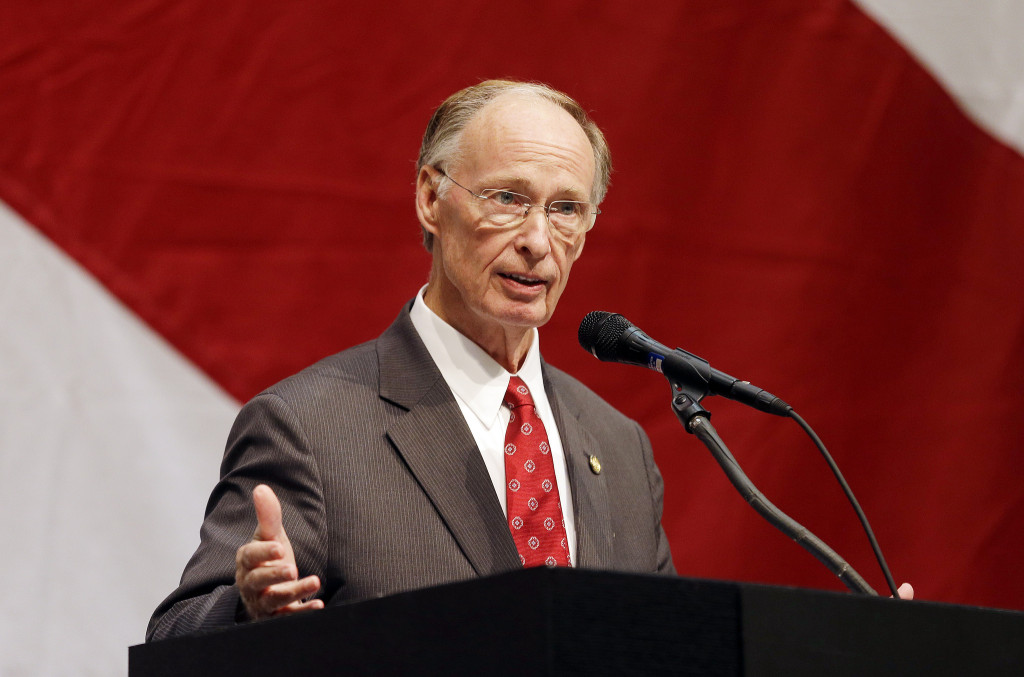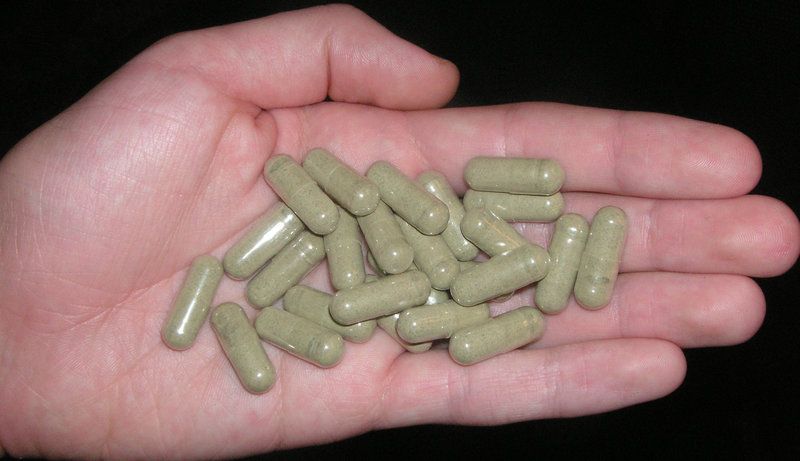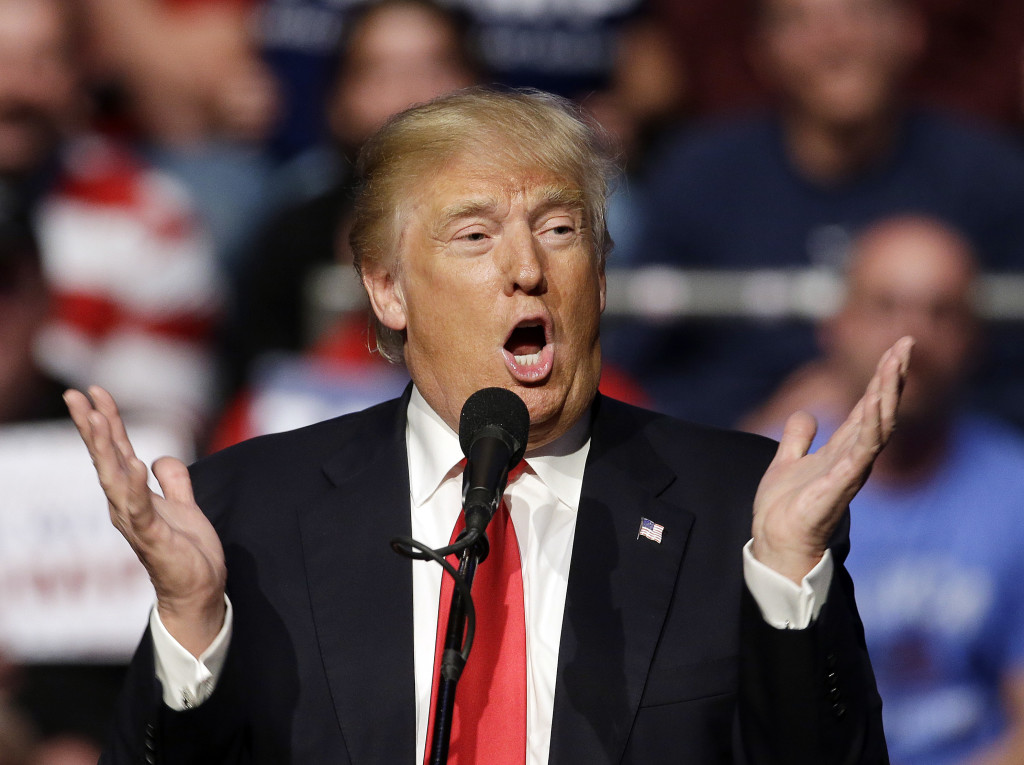Robert Bentley defends use of private email account

Alabama Gov. Robert Bentley told reporters Thursday his use of a nonstate private email account, as reported by AL.com, is subject to public records requests, defending the practice. “Why use a private email account for public business and, if you did, shouldn’t those be a public record?” a reporter asked the 2-term governor, who has recently come under investigation and possible impeachment for an alleged affair with his former senior adviser Rebekah Mason. Bentley has maintained he did nothing wrong throughout the relationship, and has said he will cooperate diligently to clear his name. The question came during a brief time with media after a military appreciation luncheon on Maxwell Air Force Base in Montgomery. “They are a public record and, in fact, whoever wrote the article does not know how to ask for the material. If they would ask for it properly they could get the material,” Bentley answered. “All of that is public record. All they have to do is go and ask the person who either sent the email that’s public or received an email from me, and they can get it. That’s public record. “Nothing is being hidden. Everything is open. All they have to do is access it properly.” The governor’s response is a continuation of the administration’s historical stance on the use of unofficial emails, saying if it is with another state employee it is captured on their official account, which is subject to public record. “The Governor’s Office takes its archival responsibility seriously — both from a legacy perspective and a legal perspective,” said Bentley’s director of communications Jennifer Ardis. “As files are closed and matters concluded, these are archived on a rolling basis in accordance with the Governor’s Office Records Retention and Archiving Policy.” AL.com’s original investigation into the governor’s use of personal email accounts to conduct state business, including alleging emails between Bentley and Mason, resulted in what amounted to a closed door, with the governor’s office saying, “This request is not subject to the Alabama Open Records Act to the extent the request is for email communications conducted on personal accounts.” But for investigative reporters fishing for communications between Bentley and Mason, this too could present a problem, as Mason hasn’t been a state employee since 2014.
Tom Jackson: Could #NeverTrump-kins swallow a coached-up Donald Trump?

I am, have been and remain intensely sympathetic to the #NeverTrump movement. But I also am a fan of the St. Louis Cardinals baseball team. Have been since 1962. What does one have to do with the other? Just this: The 2011 Cardinals taught me you never say “never.” That team, which shouldn’t have made the World Series in the first place, was, in consecutive innings of Game 6, down to its final strike. Long story short — there’s a book, “One Last Strike,” if you hunger for the details — the Redbirds conjured up a couple of miracles, staved off elimination and wound up beating the Texas Rangers in seven games. And so, because I am a sucker for sports-related metaphors, I reiterate: Never say “never.” This terrible, horrible, awful Trump thing, under precisely the right circumstances, could work out. Granted. Such a phenomenon is less likely than the alignment of celestial bodies just before Dave Bowman plunged inside the monolith in “2001: A Space Odyssey,” and that required Hollywood manipulation. Still, the Cardinals were down to their last strike. Twice. And, in the real world, prevailed. So I keep thinking: Suppose Trump, who is many detestable things, but stupid is not among them, gets himself coached up? Publicly, at least, House Speaker Paul Ryan suggests such a thing is not just possible, but probable. What was important about their May 12 meeting in Washington, Ryan said, was identifying “the core principles that tie us together.” Next would come “planting the seeds to get ourselves unified.” Yes, stipulated: You can believe that if you want to. Ryan, the wonk’s wonk, promised “going … a little deeper in the policy weeds” in time, breathing faint hope into the microscopic coach-him-up cohort. Not that Trump has provided much evidence about his willingness to plunge into public policy details. Still, a guy famous for erecting exquisitely appointed high-rises surely understands the importance of blueprints, right? Of course he does. So far, however, he has sailed ahead on a foam of blather, drowning all those opponents with their 20-point cures for every civic malady. Trump fans like Trump not for the layers of his action plan, but because he shares their goals. How he would get from here to there is no more important to them than when the water heater conks out, or our car runs rough, or the wireless network breaks down. The experts want to tell us how they’re going to fix it, but we don’t care and probably wouldn’t understand anyway. What we want to know is how fast can they get it done, what it’s going to cost and whether they guarantee their work. Save the explanations for the break room, OK? That’s Donald Trump’s campaign in a nutshell. He doesn’t waste our time with rivet placements, concrete curing schedules and electrical schemes. Trump is all broad, bold strokes — the wall, the winning, the greatness, the sticking it to China — and it’s working for him. It’s not like he’s the first guy to succeed by reducing what’s obviously complicated into simple terms. Earl Weaver, the legendary Baltimore Orioles manager, said winning boiled down to starting pitching and three-run homers. Ronald Reagan said he would cut taxes, expand the military and defeat communism. Then again, baseball fans knew Weaver appreciated hitting behind the runner, throwing to the right base and having the pitcher cover first. And voters knew, from 20 years of speeches and eight years as governor of California, Reagan understood how to grind political sausage. By contrast, Trump supporters are behind their guy — whom The Wall Street Journal’s James Taranto calls “an ideologically heterodox vulgarian with no experience in government or politics” — mostly on faith. Why? Because they regard him the way Abraham Lincoln did the indispensable Ulysses S. Grant: “He fights.” Well, fine. There is something to be said for brawlers, and, if recent polls are credible, this one is showing remarkable punch. Besides principle — an admirable quality, not to be discounted — a central claim of the #NeverTrump movement has been that a GOP ticket crowned and be-clowned by the Donald would lose spectacularly, reversing conservative Republican gains of the last six years. If such a projection begins to fizzle, #NeverTrumpkins might have to reconsider choking down that excrement sandwich. For them — for us, for me — Trump’s willingness to take counsel from those astride the same broad plain — securing the border; projecting strength abroad; getting the nation’s fiscal house in order; tax reform — but, like expert subcontractors, deeply schooled in the details, would at least provide a palate-soothing condiment.
Alabama bans ‘Kratom’ over addiction and abuse fears

A little-known plant-based substance often sold as an herbal supplement to address chronic pain is raising alarm bells in states concerned that it could be as addictive as heroin. The controversy around kratom — a plant originating in Southeast Asia — has led Alabama to become the sixth U.S. state to ban it. Kratom is now a Schedule 1 drug in Alabama, the same classification as heroin and ecstasy. Wisconsin, Vermont, Tennessee, Indiana and Arkansas have also banned the botanical supplement, and more states are considering the same course. The federal government, too, has worries about kratom. The Drug Enforcement Administration designates kratom as a “drug of concern” — meaning that, although it is still technically legal, it poses risks if abused. The U.S. Food and Drug Administration lists kratom as an herbal supplement, which means it is not regulated as vigorously as pharmaceuticals before it reaches consumers. The FDA warns of a range of side effects from vomiting to aggression and hallucinations. Yet the drug’s popularity is indisputable, and its advocates staunchly insist kratom is nothing more than a natural analgesic that can be safely used to alleviate pain, combat fatigue and reduce depression and anxiety. “Naturally occurring Kratom is a safe herbal supplement that’s more akin to tea and coffee than any other substances,” the American Kratom Association says on its website. Kelly Devine, an Alabama native who founded the group Kratom United, says some of the kratom products sold may be mixed with unhealthy additives but the plant itself is a natural pain reliever. “We’re not seeking drugs, we’re seeking relief,” Devine said. Kratom grows naturally in Thailand, Malaysia, and elsewhere in Southeast Asia and was traditionally chewed or boiled into tea by workers in that region of the world to boost productivity because kratom at low doses can act like a stimulant. At higher doses, kratom yields a sedative and pain relief effect. Experts say two properties in the plant –mitragynine and hydromitragynine–bind to the same brain receptors as classic opioids like hydrocodone, though kratom is less potent. Oliver Grundmann, clinical associate professor of medicinal chemistry at the University of Florida School of Pharmacy, said opioid addicts could get relief from kratom, since the same brain receptors are affected. In a 2013 University of Mississippi study, researchers found that mitragynine “blocked all withdrawal symptoms” in methadone-addicted mice who were fed kratom leaves. Researchers have seen heroin users cycle to kratom, but Grundmann says addicts are known to begin reusing heroin as the body develops a tolerance to kratom. Shortly after the law making kratom sales and possession illegal in Alabama took effect May 10, products like brightly colored “Krazy Kratom” bottles were being pulled from the shelves of retailers — gas stations and head shops in particular. Barry Matson, chairman of the Alabama Drug Abuse Task Force, doesn’t want to stand in the way of anybody getting medication that helps them but doesn’t think solutions can be found in a gas station product. “We don’t need this on shelves if it’s powerful enough to replace (heroin) for some people.” Though Matson said there are cases in Alabama of deaths and injuries involving kratom, Grundmann says he’s seen no evidence to indicate kratom was the “sole contributing drug” to an overdose death in the U.S. However, research is so limited that experts aren’t sure how other compounds in the plant interact with other substances. “We’re always trying to catch up behind the latest trends,” Grundmann said. “There are so many different drugs, so many different ways to abuse drugs that we don’t initially think about.” Republished with permission of The Associated Press.
Donald Trump to wary Republicans: Trust me. Really.

Call it Donald Trump‘s trust-me tour of the Republican establishment. The lone political survivor of a riotous GOP primary is embarking on another campaign, this time to convince wary Republican leaders to sign on to his improbable turn as their presidential nominee. Trump is seeking to show – not just tell – that he’s a conservative who will unite the party and help the GOP hang on to its congressional majorities. Trump’s branding effort is showing signs of working: He’s collected some key endorsements on Capitol Hill. And some critics, such as Sen. Lindsey Graham, have muted their nastygrams. But he’s working in what could be a very short window, while likely Democratic opponent Hillary Clinton labors to vanquish Sen. Bernie Sanders‘ stubborn challenge. And it’s far from clear how long Trump and top Republicans can remain on their best, most unified behavior. Here’s a look at Trump’s drive for buy-in from the GOP establishment: —- TRUST ME: I’M A CONSERVATIVE It’s one of the top GOP concerns about Trump: He wasn’t a Republican for most of his public life, so how conservative could he be? Who Trump would nominate to the Supreme Court, which now has one vacancy and almost surely will have more in the coming years, has lingered as a key question. House Speaker Paul Ryan discussed the issue with Trump at their meeting last week; the billionaire assured Ryan he’d release a list of potential nominees, “soon.” He demonstrated follow-through: On Wednesday, Trump named 11 federal and state court judges he’d consider as potential replacements for the late Justice Antonin Scalia, any of whom would restore conservative control of the court lost with his death. The group was widely praised as a conservative dream team. — TRUST ME: I’M A LOYAL REPUBLICAN Trump has said for weeks that he wants to unite the party and help it raise always-welcome political cash. On Thursday in New Jersey, he demonstrated one way how. Trump attended fundraisers designed to help former rival Chris Christie and the state Republican Party pay down debt they incurred during the governor’s presidential campaign and the party’s legal bills from the George Washington Bridge scandal. Christie, who folded his presidential campaign and endorsed Trump, took a huge risk earlier this year to endorse the billionaire. The pair attended a $25,000-per-person fundraiser for the state GOP to help it pay off about $500,000 incurred in legal fees, an event that could go a long way toward making that debt disappear. Trump and Christie headlined a separate, $200 per-person fundraiser to pay down Christie’s roughly $250,000 presidential campaign debt. — TRUST ME: THE REPUBLICAN NATIONAL COMMITTEE DOES Trump and the RNC this week signed a joint fundraising agreement that will allow donors to write checks of up to $449,400. The agreement will allow the Trump campaign to raise cash that the national party can spend on both his campaign and other Republican efforts. RNC Chairman Reince Priebus said it will go toward expanding ground, data and digital operations to elect Republicans “up and down the ballot.” — TRUST ME: I’M RUNNING A PROFESSIONAL CAMPAIGN NOW The early iteration of Trump and a few inexperienced aides running the campaign has morphed into a more professional operation as Trump has brought in seasoned political operatives. Political veteran Paul Manafort is running the convention operation; RNC Finance Chairman Lew Eisenberg will head up the joint fundraising project. And after suggesting that pollsters are a waste of money, Trump hired pollster Tony Fabrizio, who’s worked for GOP presidential candidates going back decades. — TRUST ME: I’VE GIVEN POLICY SOME THOUGHT Trump caused much indigestion among Republican leaders in March when he said on MSNBC that women who have abortions should be punished – then changed positions and settled on leaving the law the way it is. Then-rival Ted Cruz groused that Trump clearly hasn’t given “serious thought” to policy. Trump has sought to refute that impression, giving a foreign policy speech to the National Press Club earlier this month, an address to the National Rifle Association on Friday, an energy speech next week and beyond that, an address on economic policy. — TRUST ME: I’M LISTENING Across the Sunday news shows last weekend, key Republicans described party unity as the education of Donald Trump. Even his chief Senate ally, U.S. Sen. Jeff Sessions of Alabama, who sits on the armed services committee, said Trump is “going to need to learn. He’s going to need to understand really completely … how complex this world is.” Also on ABC’s “This Week,” U.S. Rep. Tom Cole, R-Okla., called him “a work in progress.” And Ryan has refused so far to endorse Trump. But Trump is meeting with lawmakers and taking their calls. And his aides, including Manafort, are shuttling between meetings with members of Congress and policy think tanks taking suggestions for policy papers. For all of this stated open-mindedness, though, Trump was quoted by The New York Times last weekend: “Just what I need is more advice. The (Republicans) I beat are still giving me advice.” Republished with permission of The Associated Press.


